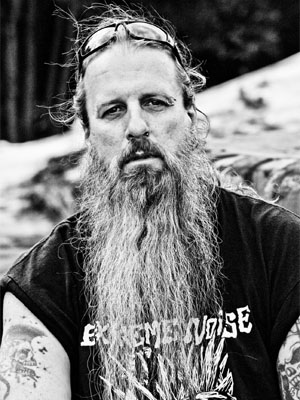Guest post by William Pilgrim
A reader recently posted a comment asking my opinion on modern extreme metal bands like Teitanblood and Ascension. We often take it as an article of faith that modern metal is a fallen genre that parted ways from the aspects that made the heyday of this music so glorious; indeed, it is almost a guarantee that any random second or third tier album from the early years of the genre will compare favourably with the current wave of practitioners.
But why should this be so? Forget about the intangibles for just now; elan vital, vir, passion, and spirit, as much stock as one puts in them, are ultimately amorphous, unquantifiable entities. But to the discerning ear, the very manner in which this music is played contributes greatly to the nurture and propagation of these ideas. But let’s not leave it at that even; the manner in which music is played is the result of an outlook on life and the world around us, a perspective that originates inside the mind with very distinct inspirations and goals assigned for itself. At least it should be so for the genuine musician who is willing to pay tribute to something greater than himself rather than be just another among the flock vying for whatever holds his fancy in the moment. When looked at from this angle, song writing and the musical techniques involved therein become offshoots of a state of mind. The difference between old and new then becomes the difference between states of mind that are separated by time, culture, and upbringing.
https://www.youtube.com/watch?v=dhpPk5dovHg
On the surface – and this is a broad generalization but it holds for the most part – new extreme metal bands lack definition and detail in riffs. Consider the most recent Teitanblood album Death and contrast it with something as universally unheralded – deservedly so in many quarters – as Krabathor’s debut Only Our Death from 1992. Teitanblood, hugely influenced as they are by the war metal of Blasphemy, attempt to paint broad swathes of atmosphere through repetition as opposed to the many-toothed, serrated approach to songwriting that Krabathor and others from that pocket of time display. The former lulls the unsuspecting listener into a trance-like state by concealing its lack of songwriting virtue through synthetic extremeness, but the second approach usually contains more thought, effort, and dynamics, and mimics the constant upturning and redressal of values that great death metal strives towards.
Borrowing terms from the schools of art and retrospectively applying them to metal, we can then say that old death metal is a curious but potent blend of romanticism and a nihilistic expressionism, on more or less equal footing: romantic in self-awareness, expressionist in revealing the horrors of the mind, and nihilistic in rejecting established values in favour of new belief systems. A band like Teitanblood, on the other hand, can be said to belong to an impressionist state of mind, the word impressionist signifying in no way any relation between Teitanblood and purveyors of that stream of thought in the arts. Instead, impressionism is used here merely to suggest the preeminence of mood over content, and the blurring of the music’s outer edges to the point of dissociation.
One might say that even undisputed classics like Darkthrone and Burzum used the repetition mentioned above to make their point, but the important thing to remember in those bands’ cases is that repetition was used as a story telling device to travel between distinctly realized book ends. Many modern bands seem to lack the roughest notion of what it means for a song to have a beginning and an end, and how islands spread across the length of the song can be used as “hooks” to hop from one spot to another, but always with the ultimate aim in mind: the song is God and everything else superfluous. Hear the song posted below from Ascension, a band many supposedly educated fans claim to be the second coming of the genre. Then contrast it with the Kvist song that immediately follows. Hear them back to back so that the dissonance stands out in stark relief.
Hear how the entire body of ‘Vettenetter’ is geared towards safeguarding the primacy of a greater idea, an idea that is directed outwards as opposed to the redundant, self-absorbed mannerisms of the Ascension track. The feelings Kvist induce in the listener can be classified as “romantic” in the truest sense of the word, a mixture of awe, beauty, human insignificance, yes, but also the perpetual struggle to understand and realize a greater meaning to our place in the world. As opposed to Kvist’s romanticism, however, bands like Ascension are entirely hedonistic, which by association implies a pathetic solipsism. The self is greater than the whole, the moment is greater than eternity, live now while you can, however you can, for who knows what tomorrow will bring?
This isn’t just abstract wool gathering; Ascension’s solipsism manifests itself in the carelessly strewn-about rock star solos, in the abrupt shifts in tone, in the complete absence of a unifying theme, and ultimately in the absurd, conceited belief that what they’re doing is in any way or form of artistic merit. Where Kvist intentionally dwarf themselves in humble tribute to the magnificent life-giving forces of nature, Ascension are like ghosts trapped between worlds, with no sense of who they are or what purpose they presently serve. Their concoction is cynically designed to appeal to Everyman, meaning the lowest common denominator in listener intelligence. A little of this, a little of that, take a potluck lunch home and you’re bound to find a bone to gnaw on. World Terror Committee, indeed.
Which of the two is the greater evil? Teitanblood’s impressionism, cheap and disoriented as it is, can be understood on some level as a honest effort from poor students of the metal genre. That is not to give it more credence than it deserves nor does it mean that it shouldn’t be called out for its many weaknesses or for its fans’ sheep-like mentality. But it’s only a matter of time before these bands are consigned to the dustbin of obscurity because of their self-devouring approach to music.
Bands like Ascension, however, work on the principle of fast-food equality, but through mechanisms subtler than what Cradle Of Filth and Dimmu Borgir employed twenty years ago. On the surface, they appear intoxicating to simpler tastes, shiny exterior, ersatz evil and all. They even go some distance in mimicking the sound of their elders, only to douse jaded listeners with buckets of icy cold water. Most listeners don’t care, however, and these pathetic tidbits are enough to guarantee the Ascensions of the world a name in the “new underground” for the foreseeable future.
The greater tragedy, however, is that these bands signify the death of the mind, and this is evidenced in the class of discussion that occurs around them and their music. To sensitive ears and minds, there is no higher emotion that a plastic, cookie-cutter band like Ascension is capable of eliciting, but by their subversive nature and by being infiltration points into this music for all the wrong elements, bands like these present the greatest danger to metal. That should no longer be considered an exaggeration, because for every new kid that discovers old treasures, ten more will flock to an Ascension and will eventually use the same strategies when they come to make music of their own, not knowing any better. After all, noise when amplified enough will always drown out quality.
60 CommentsTags: 2015, ascension, comparative, guest author, krabathor, kvist, teitanblood






